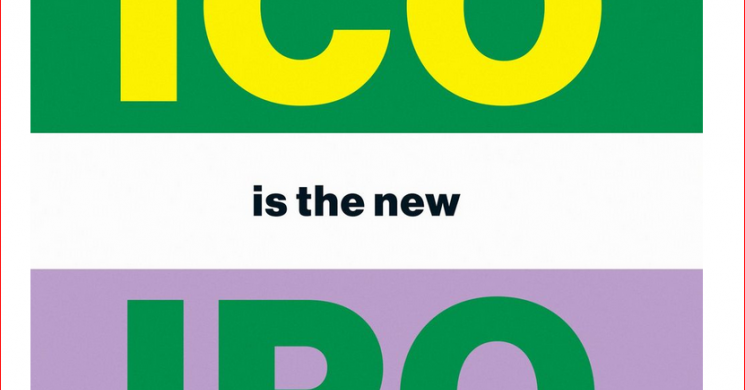
Crypto IPOs?
via Matt Levine
ICOs.
Is there a good way to think about initial coin offerings? The idea of an initial coin offering is that a company builds, or promises to build, some blockchain-based platform that allows people to buy or sell some product or service. (It seems like it's usually cloud storage.) And then it creates a digital token -- its own "coin" -- that you have to use to buy or sell the product. And then it sells the coins, all at once, to the public, often before the product is fully up and running; the buyers can use the coins to buy the product, or try to sell them to someone else for a profit. And then the company goes to conferences to gloat about how it has disrupted the venture-capital funding model and shown the way to the future of capitalism and so forth:
More and more startups are offering tokens as a way to raise money upfront in so-called initial coin offerings (ICOs), a nod to traditional initial public offerings of securities. So far this year, 63 sales have raised $521 million, according to blockchain research firm Smith + Crown. That has already far surpassed the $260 million raised in 2016, says Emma Channing, general counsel at Argon Group, a year-old digital finance investment bank in Los Angeles.
One thing you could think about is what this tells us about how businesses should be funded. Most companies want to sell a product, don't have enough money to build it, and so go to investors to get the money. Then they build the product, sell it to customers, get money from the customers, and give some of the money back to the investors. Raising money from customers rather than investors, as ICOs notionally do, has some obvious appeal: It cuts out the middleman, in a sense, and it also lets the company share some of its profits with early-adopter customers rather than investors. The company and the customers are necessary components to the system; the investor, in the new model of blockchain capitalism, is just an interloper, and can be dispensed with.
On the other hand, if a company has raised tens of millions of dollars by pre-selling its product to customers before ever building the product, why would it build the product? ("When ICO’s deliver 100% of the company’s expected receivables at launch, founders are incentivized to leave their project immediately thereafter," writes Chris DeRose.) This is a problem for investors too -- if a company has raised tens of millions of dollars by selling shares to investors before ever building a product, why not run off to Belize rather than build the product? -- but there is a well-developed set of legal protections for investors, for exactly that reason. The legal status of coin-buying customers is a little vaguer.
Another thing you could think is: Well, is it vaguer? One obvious worry about ICOs is that some of them might "really" be securities offerings, that "coins" are in many cases just quasi-equity interests in blockchain-based businesses and should be subject to all of the standard securities regulations. Here is a December white paper on the subject, but one overly simplistic and not-at-all-legal-advice way of thinking about it is: If customers are buying coins as a way to fund their eventual purchase of cloud storage or whatever, then the coins are not securities, but if speculators are buying coins as a way to profit from the growth of the business (or the speculative frenzy around ICOs), then they probably are, and are probably subject to securities regulation. Which do you think it is?
“It seems as if there’s this enormous financial pressure of money that wants to move into this space, but there’s really limited places for it to go,” says Brian Lio, chief executive officer of Smith + Crown. But an offering that sells out in seconds may work against some of the bigger goals of a blockchain enterprise. Tokens are supposed to be used by customers. “If your token instantaneously sells out to a few institutional investors, you’re missing a big point of tokens, which is to get them to users and build a community,” says Lio.
One way to tell the story is that bitcoin demonstrated definitively that a privately created digital currency can become worth tens of billions of dollars based solely on ... I don't know, based solely on some sort of psycho-sociological thing that you can give your own name to: "trust" would be a good word to fill in the blank, or "widespread acceptance," or "speculative frenzy" would work almost as well. Everyone vaguely knew that -- it's how, like, dollars work -- but bitcoin demonstrated it in a particularly pure and salient way.
But it's hard to repeat that pure feat: "Bitcoin will replace fiat currency" is a good pitch for a new cryptocurrency, but "mattcoin will replace ether which will replace bitcoin which will replace fiat currency" is less compelling. But you can tap into it obliquely. If you are a company with a digital product, or an idea for a product, you can yoke that product to the bitcoin phenomenon: "Buy one unit of cloud storage and we'll throw in five free units of speculative frenzy!" And people who want cloud storage might buy your coins, or not. (There are other cloud storage companies.) But people who want speculative frenzy will definitely buy your coins, because initial coin offerings are the main way to get in-on-the-ground-floor bitcoin-style speculative frenzy these days.
By the way, I say "it's usually cloud storage," but in fact there are ICOs for all sorts of internet businesses, and some not-quite internet businesses:
Which may (sort of) explain LGD, the digital token for the Legends Room, which describes itself as “a world class Las Vegas gentlemen’s cabaret re-imagined using blockchain technology,” according to the website. It sold about $1 million in LGD in an ICO that closed in May, says Peter Klamka, a consultant who set up the token strategy for the business.
Here's the website, which is perhaps not entirely safe for work. I was vaguely hoping that the club would exist entirely on the blockchain -- that would be innovative! -- but no, there seems to be a physical location.
Read more by Soren K.Group







